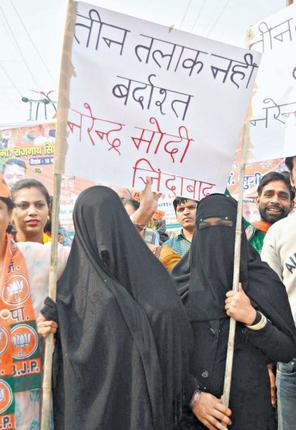That there is so much fuss and opposition from identity assertion groups on Allahabad High Court terming triple talaq “unconstitutional” is in itself a manifestation of how difficult it has become to push rights guaranteed by the Constitution to the minority community. The practice of triple talaq, wherein the husband only needs to utter the word talaq thrice in order to effect a divorce has been a bone of contention among Muslim women and various rights groups in India ever since the Shah Bano case and the following tussle between the Rajiv Gandhi led government and BJP during the ‘80s. In 1986, the Rajiv Gandhi government went to the extent of passing a law in order to override the hard earned Supreme Court verdict on the Shah Bano case which granted alimony (maintenance) rights to Muslim women, although with conditions.
Regardless of the legacy of previous dispensation the BJP-led Centre today has become the first dispensation in New Delhi to openly take a clear stand against the social menace of triple talaq.
The Allahabad HC’s decision, although a decision as obvious as it is should have come long before, makes the Centre stronger in the ongoing battle for social justice between the All India Muslim Personal Law Board- which in itself is a male dominated entity- and the Centre with active support from the Bharatiya Muslim Mahila Andolan (BMMA) and a slew of NGOs.
It must come as a surprise to many in India that even Islamic nations such as Saudi Arabia, Pakistan and Iraq have either banned or restricted this practice. This stance by Islamic nations is not without reason, for the BMMA has consistently argued that triple talaq is “unQuranic” too. However, it is common sense that an “unconstitutional” practice should be dealt with whether or not it adheres to the holy scriptures. Coming to the opposite side of the debate, the AIMPLB stand has always been along the lines of: law and order should not interfere with religion. AIMPLB has been quite the rebel when it comes to the idea of gender equality and it only invokes doubt in the minds of common citizens why the pallbearers of Azadi parroting the romanticized egalitarian ideas never make a bold statement on the open, scathing remarks made by AIMPLB.
One such disturbing remark can be seen in this extract from an affidavit filed by AIMPLB in Supreme Court: “Sharia grants right to divorce to husbands because men have greater power of decision making. They are more likely to control emotions and not take hasty decisions”.
Zakia Soman, co-founder of BMMA and an ardent fighter of unjust Islamic practices, was completely right when she retorted: “Their stand that men have greater reasoning power compared to women smacks of a medieval mindset and prejudice against women.”
It is due to the space for free run given to institutions like AIMPLB by the lopsided secular heritage of India that Muslim women today have to be content with outrageous instances like getting divorced over phone, as the case filed by an aggrieved woman, Ishrat Jahan from West Bengal goes. It happens so that her husband of 15 years called her from Dubai, said talaq talaq talaq before cutting the call. She wants her 4 children back, and maintenance.
At the heart of this issue is the conflict between the sense of unquestionable autonomy given to religions and religious practices by successive governments in India and the unending fight for fundamental rights and equality before law. Islam is not the only bad egg in this scenario. While there is a rich heritage of reforms- from the times Raja Ram Mohan Roy’s campaign to end Sati to Babahaseb Dr. BR Ambedkar’s legendary fight abolishing Untouchability, and the controversial Hindu code Bill brought up by Jawaharlal Nehru- Hinduism and Hindu practices have been codified and reformed upto a large extent, although the march towards equality and dignity is still a work in progress. In the case of Christianity, there is a feeble yet increasing voice, including that of former Supreme Court judge Asok Kumar Ganguly- a staunch supporter of Uniform Civil Code- for the abolition of the norm of two year waiting period for women before finalizing a divorce. A look at the plethora of personal laws under each religion and the difficulties meted out to its followers, especially the traditionally disadvantaged groups such as women and oppressed communities only strengthens the call for a Uniform Civil Code.
And as for the fierce guarding of the Sharia and autonomy of Islam by AIMPLB banking on the rights provided under freedom of religion, Babasaheb’s insightful words from his book Pakistan or The Partition of India will tell us what the designer of our Constitution thought: “Take the position of women. It is insisted by Muslims that the legal rights given to Muslim women, ensure them a greater measure of independence than allowed to other Eastern women … the Muslim woman is the most helpless person in the world … her fate is ‘once married, always married’. She cannot escape the marriage tie, however irksome it may be. While she cannot repudiate the marriage, the husband can always do it without having to show any cause. Utter the word ‘Tallak’ and observe continence for three weeks and the woman is cast away … This latitude in the marriage in the matter of divorce destroys that sense of security which is so fundamental for a full, free and happy life for a woman. This insecurity of life, to which a Muslim woman is exposed, is greatly augmented by the right of polygamy and concubinage, which the Muslim law gives to the husband” .
